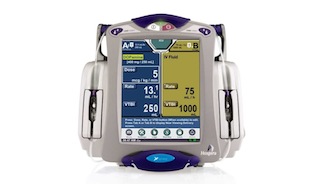Cybercrime
See the following -
FDA Tells Hospitals to Ditch IV Pumps That Can Be Hacked Remotely
 The Food and Drug Administration "strongly encourages" hospitals to stop using Hospira's Symbiq Infusion System, because it's vulnerable to cyberattacks that would allow a third party to remotely control dosages delivered via the computerized pumps. Unauthorized users are able to access the Symbiq system through connected hospital networks, according to the FDA and the Department of Homeland Security's Industrial Control Systems Cyber Emergency Response Team...
The Food and Drug Administration "strongly encourages" hospitals to stop using Hospira's Symbiq Infusion System, because it's vulnerable to cyberattacks that would allow a third party to remotely control dosages delivered via the computerized pumps. Unauthorized users are able to access the Symbiq system through connected hospital networks, according to the FDA and the Department of Homeland Security's Industrial Control Systems Cyber Emergency Response Team...
- Login to post comments
Hacker Calls Health Security "Wild West'
As head of the security consulting firm Secure Ideas, [Kevin Johnson's] job involves probing into organizations' networks and applications to identify vulnerabilities. And what he sees in healthcare terrifies him...
- Login to post comments
McAfee Labs Threats Predictions Report Previews Cyber Threats for 2017 and Beyond
 Intel® Security today released its McAfee Labs 2017 Threats Predictions Report, which identifies 14 threat trends to watch in 2017, the most critical developments to watch for in cloud security and the Internet of Things (IoT) security, and the six most difficult-to-solve challenges facing the cybersecurity industry. The report reflects the informed opinions of 31 Intel Security thought leaders. It examines current trends in cybercrime and makes predictions about what the future may hold for organizations working to take advantage of new technologies to both advance their businesses and provide better security protection...
Intel® Security today released its McAfee Labs 2017 Threats Predictions Report, which identifies 14 threat trends to watch in 2017, the most critical developments to watch for in cloud security and the Internet of Things (IoT) security, and the six most difficult-to-solve challenges facing the cybersecurity industry. The report reflects the informed opinions of 31 Intel Security thought leaders. It examines current trends in cybercrime and makes predictions about what the future may hold for organizations working to take advantage of new technologies to both advance their businesses and provide better security protection...
- Login to post comments
New Global Survey Finds Companies Lack Adequate Data Privacy and Consent Tools
 ForgeRock®...announced the results of its global survey conducted by TechValidate, which found 93 percent agreement among IT professionals that customer data privacy concerns are a critical issue at the C-level. Yet only nine percent of IT professionals surveyed believe that current privacy and consent methods are adequate. When asked about the requirements for new methods, 96 percent of surveyed IT professionals agreed that there is an increasing need for dynamic and flexible privacy tools that are adaptable to future borderless regulatory requirements and consumer expectations.
ForgeRock®...announced the results of its global survey conducted by TechValidate, which found 93 percent agreement among IT professionals that customer data privacy concerns are a critical issue at the C-level. Yet only nine percent of IT professionals surveyed believe that current privacy and consent methods are adequate. When asked about the requirements for new methods, 96 percent of surveyed IT professionals agreed that there is an increasing need for dynamic and flexible privacy tools that are adaptable to future borderless regulatory requirements and consumer expectations.
- Login to post comments
Report: Ransomware Attacks on IoT Medical Devices Will Likely Increase
Cyber attackers are increasingly breaching Internet-enabled medical devices using ransomware and this is likely to continue for the next two to four years, according to Intel Security’s recent McAfee Labs 2017 Threats Predictions Report. According to the threat predictions report, in which Intel Security interviewed 31 security thought leaders, while it is not currently known why attackers are breaching medical devices that collect patient data, the attacks are happening and medical data is being exfiltrated...
- Login to post comments
We’ve Learned The Wrong Lessons From Aaron Swartz
Over at the (highly recommended) Popehat blog, Ken White reviews the new documentary about the late Internet activist Aaron Swartz and in doing so waxes eloquently on privilege, justice and sketpicism. Read More »
- Login to post comments
Will 2015 Be Worst Year Yet For Data Breaches?
This past year the FBI warned the entire healthcare realm that security practices are not keeping pace with other industries. And a new report is suggesting that healthcare organizations should expect even more data breaches in the New Year...
- Login to post comments
Will “Digital Fingerprint” Forensics Thwart the Data Thieves Lurking in Hospital EHR Corridors?
 As Halloween approaches, the usual spate of horror movies will intrigue audiences across the US, replete with slashers named Jason or Freddie running amuck in the corridors of all too easily accessible hospitals. They grab a hospital gown and the zombies fit right in. While this is just a movie you can turn off, the real horror of patient data theft can follow you...Unfortunately, this horror movie scenario is similar to how data thefts often occur at medical facilities. In 2015, the healthcare industry was one of the top three hardest hit industries with serious data breaches and major attacks, along with government and manufacturers. Packed with a wealth of exploitable information such as credit card data, email addresses, Social Security numbers, employment information and medical history records, much of which will remain valid for years, if not decades and fetch a high price on the black market.
As Halloween approaches, the usual spate of horror movies will intrigue audiences across the US, replete with slashers named Jason or Freddie running amuck in the corridors of all too easily accessible hospitals. They grab a hospital gown and the zombies fit right in. While this is just a movie you can turn off, the real horror of patient data theft can follow you...Unfortunately, this horror movie scenario is similar to how data thefts often occur at medical facilities. In 2015, the healthcare industry was one of the top three hardest hit industries with serious data breaches and major attacks, along with government and manufacturers. Packed with a wealth of exploitable information such as credit card data, email addresses, Social Security numbers, employment information and medical history records, much of which will remain valid for years, if not decades and fetch a high price on the black market.
- Login to post comments